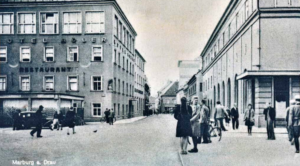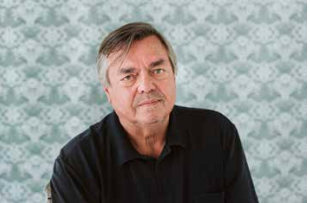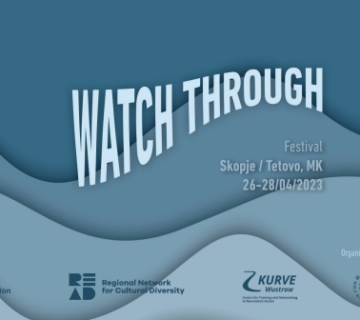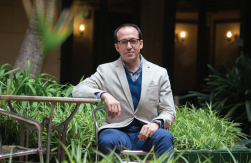Drago Jančar (born in 1948, Maribor, Slovenia) is is one of the most outstanding writers in Central and Eastern Europe. Jančar’s novels,
essays and short stories have been translated into more than twenty languages and published in Europe, Asia and the United States. He has been awarded several national and international literary prizes.
(Fragment from the novel, the beginning)

Chapter One
The girl in the photograph
1
The photograph, taken by an unknown photographer, shows two slender girls: the first in a check skirt, a thin cardigan and dark stockings, the other in an elegant black coat and with nicely woven plaits falling down her back. She is without stockings, so this is probably the remnants of a warm summer, the last breaths, probably early September. A picture of town residents going about their morning business, a woman with a briefcase, some standing around aimlessly. Here is a man on a bike chatting with someone, probably about the weather, someone else dragging on a cigarette and exhaling into the still morning air. A careful eye can discern that something has happened to the inscription on the large building: HOTEL OREL has become the Germanic HOTEL ADLER – a small correction, the practical owner has had only two new letters made, A and D – whilst the Slovene word RESTAVRACIJA has become RESTAURANT. In the lower right corner is a man in uniform walking away from the photographer. He is wearing high black boots, a grey military jacket and a holster. The idyllic image of a peaceful early autumnal morning on a Maribor street is transformed in a moment by unseen tension: where is he coming from, where is he going, the man in uniform, who is almost certainly a Schutzstaffel or SS officer, entering from the edge of the photograph and heading into its depths? For now he is a stranger, but the next moment the blonde in the check skirt and black stockings looks towards the man in uniform and says to her friend:
“Doesn’t he look just like Ludek?”
The girl with the plaits just manages to catch the profile of the passing German officer.
“Could be,” she says. “He looks a bit more grown up,” she laughs.
But she is soon serious when she sees her friend’s face.
The face of the girl in the check skirt and black stockings shows concern, something is troubling her, perhaps she has just told her friend what is troubling her, when suddenly she realises.
“It’s him,” she says, “I know him.”
For some time they watch him.
“Do you think I should say something?” The girl in the check skirt asks, in an agitated, almost tremulous voice.
“I would in your place,” the girl with the plaits gives an encouraging nod and then shrugs: “It won’t cost you anything.”
The girl in the check skirt is shuffling her feet nervously.
“I’ll ask my father to speak to him, he knows him well.”
And after a few moments she adds:
“If he’s willing to.”
“Sonja!” exclaims her friend, with a slightly teasing smile. “I think it would have more effect if you said something.”
The smile is superfluous, unnecessary: Sonja, who is anxiously kneading her handbag, does not feel like laughing or smiling, although she will soon have to smile – if she wishes to speak to the man, she will have to give him a very friendly smile.
The determined steps of the man in uniform have now taken him deep into the photograph, towards the end of the street now known as Burggasse.
“What will be, will be,” says the blonde in the check skirt suddenly, clutching her bag tighter and running after the officer. Even if she walked as fast as she could, she would not catch him. She runs.
 2
2
I see her running along the pavement, past the window of the Astoria café, after the man in uniform along Slovenska Street – a few years ago it was still Slovenska Street, but before that, when this was Austria, it was Windischstrasse, and now it is Burggasse – she runs after the German officer, she is getting closer and closer to him. For a moment she loses sight of him, he turns onto Tyrševa Street – a few years ago it was Tyrševa Street, now it is Herrengasse. The girl in the check skirt, Sonja, stops on the corner, catches her breath and looks after him. It seems as if she has had second thoughts, she can’t do this. But she must, some hope tells her that she has to do this. A moment later she decides and goes up the street. Soon she is walking almost alongside him, she is trying to breathe steadily, she doesn’t want him to see her so out of breath, she wants it to seem as if she was going for a walk, possibly to the park, or going on an errand in the same direction. She is walking almost alongside him, a step behind, perhaps once more she can’t decide whether or not to speak to him, possibly she dare not, possibly her heart is beating more quickly. Then she speeds her step, catches him up, turns to him and, as if she has just noticed him, says:
“Why it’s you, Ludek.”
The officer turns to her.
“Don’t you remember me?” says the girl in the check skirt with a smile, she has to smile.
The man stops, weighs her up, it looks as if he doesn’t know her.
“Don’t you recognise me?” says the girl, clasping her handbag more firmly to her chest. “It’s me, Sonja.”
“What do you want?” asks the officer in German, in an unpleasant, clipped voice, piercing her with a look in which there is at least some curiosity, perhaps she does seem familiar.
Sonja can also speak German, it’s not difficult for her, she learned it in secondary school, but in any case only German is now spoken in this town, so she is a little embarrassed because she spoke first in Slovene. And that to an officer in a German uniform, an officer that she wants to ask something of. The conversation could have ended even before it began, even though Ludek also knows Slovene, Sonja knows that very well – some fifteen years ago, when she was still a young girl, he spoke Slovene.
“We skied together on the Pohorje,” Sonja suddenly says in German, “you were wearing a blue pullover.” She starts using the formal pronoun, his look is such, his voice is such, that she cannot use the familiar form, or call him Ludek.
“You were wearing a blue pullover,” she continues hurriedly and out of breath, but with a forced smile, “with white stripes across … you knew my father, his name’s Anton, Anton Belak … you must remember … once we all went skiing together, you helped me up when I fell into the snow, I was all wet … wet snow.”
She utters all this in one breath and looks at him expectantly.
It dawns on him, at the name of the girl’s father the penny drops, but it appears as if he doesn’t want to know, then he really was called Ludek, now he is Ludwig, he was always Ludwig, but they used to use that stupid Slavic distortion.
He is looking at her, suddenly he laughs.
“Yes, we did go skiing up there, you’re right.”
“And I fell into the snow.”
“You fell into the snow?”
“And you helped me up. I was all wet, I lost a stick.”
“A stick?”
“A skiing stick, we were looking for it in the snow.”
Ludwig looks at his watch.
“And your father?” he asks. “How is your father?”
He doesn’t wait for an answer, he is in a hurry, he does work of great responsibility in this town, great responsibility, he can’t stand here on this Maribor street chatting endlessly with this girl, who he evidently once pulled out of the snow, wet through, perhaps also her ski stick, he looks at his watch and says that he has to get to work. But he also thinks that the girl is already a woman and that he would with pleasure pull her out of the snow once more.
“What about after work?” says Sonja, feeling her face turn red. “Maybe we could have tea together after work? In a café?”
He looks at her in surprise and a little mistrustfully. He is in the kind of job where such a proposal is immediately met with some mistrust.
“Is there something wrong with your father?” he asks straight out , for he has a feeling that behind this tea there lies a problem the girl would like to discuss.
“Not with father,” says Sonja quietly.
“If it’s an official matter, come to my office,” says Ludwig with a polite nod and then he continues on his way.
Sonja falls silent, her eyes on the ground. She is gripping her handbag so tightly that her knuckles are white. She could go after him, she could say they could go part of the way together. But she can’t, she can’t do this anymore, she did what she could. She stands there, watching him walk away.
“Just a cup of tea,” she calls out, not knowing where she has found the strength for this humiliation. Begging a German officer on the street for a date. Although it is only Ludek, the skier Ludek from her childhood. She has to put up with the meaningful looks of passers-by, as well as his forgiving smile when he turns and says:
“Okay. I’m free tomorrow afternoon. At five in Theresienhof. And I’m not Ludek. My name is Ludwig.”
Sonja nods and stands in the middle of the street watching his broad back, his black boots, the decisive step of Ludwig Mischkolnig, marching in his boots and SS uniform towards his difficult duties. She knows where Theresienhof is, a few years ago it was the Café Grand, but now only German officers sit there and girls like Sonja don’t go there, but she will go, she has to go.
Translated from the Slovene by Davide Limon



